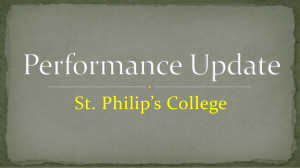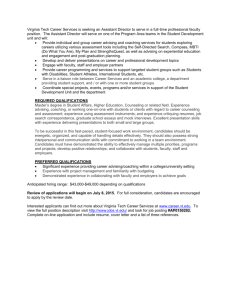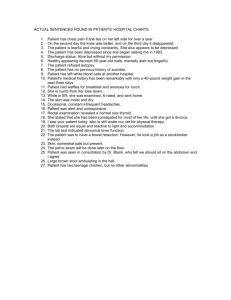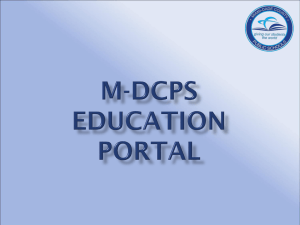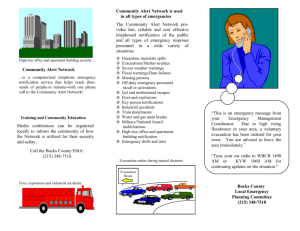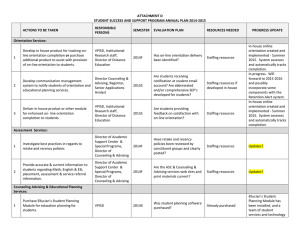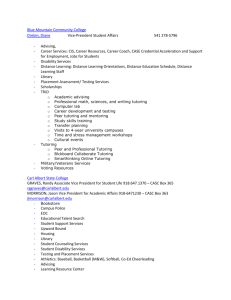Writing Center
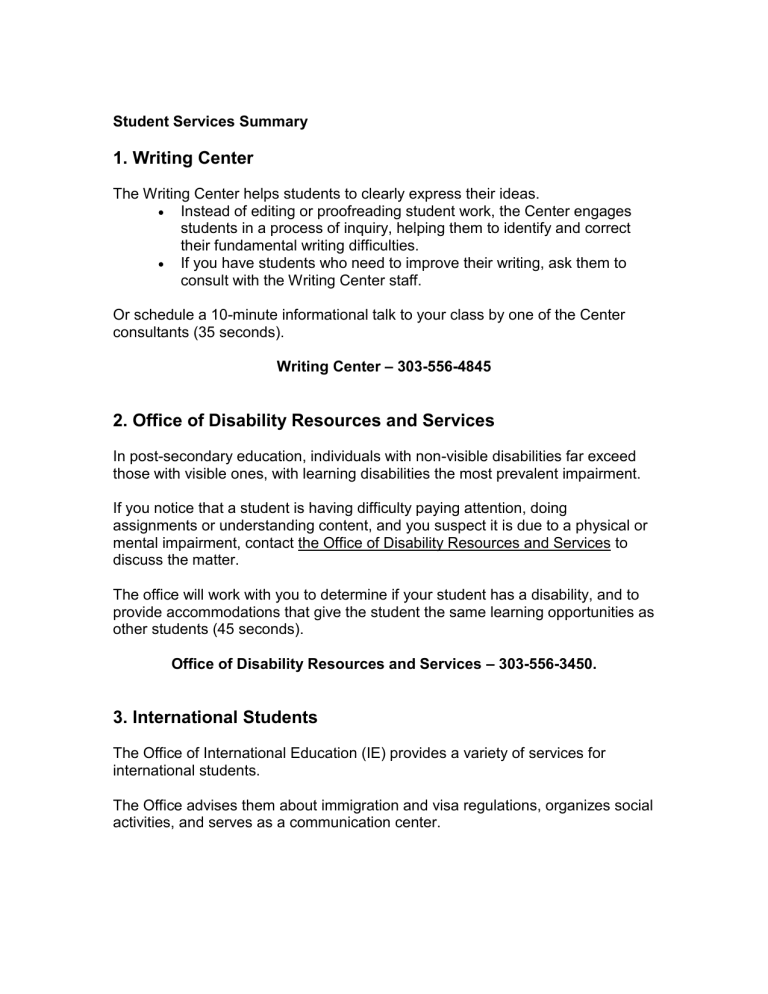
Student Services Summary
1. Writing Center
The Writing Center helps students to clearly express their ideas.
Instead of editing or proofreading student work, the Center engages students in a process of inquiry, helping them to identify and correct
their fundamental writing difficulties.
If you have students who need to improve their writing, ask them to consult with the Writing Center staff.
Or schedule a 10-minute informational talk to your class by one of the Center consultants (35 seconds).
Writing Center – 303-556-4845
2. Office of Disability Resources and Services
In post-secondary education, individuals with non-visible disabilities far exceed those with visible ones, with learning disabilities the most prevalent impairment.
If you notice that a student is having difficulty paying attention, doing assignments or understanding content, and you suspect it is due to a physical or mental impairment, contact the Office of Disability Resources and Services to discuss the matter.
The office will work with you to determine if your student has a disability, and to provide accommodations that give the student the same learning opportunities as other students (45 seconds).
Office of Disability Resources and Services – 303-556-3450.
3. International Students
The Office of International Education (IE) provides a variety of services for international students.
The Office advises them about immigration and visa regulations, organizes social activities, and serves as a communication center.
International students must maintain full time enrollment and good academic standing, because failure to do so might lead to deportation.
Before you advise an international student to drop your course or you give them a failing grade, please contact an International Education advisor for assistance.
(38 seconds)
International Students
– 303- 315- 2230.
4. Student Counseling Center
Coping with emotional and social problems increases a student’s chances of academic success.
But even students who are resilient and optimistic can feel the stress of university life, stress from loneliness, academic pressures, relationship problems, or family issues.
If you think one of your students would benefit from counseling, refer him to the
UC Denver Student and Community Counseling Center. Their specialists provide free mental health counseling to all our students.
David Fenza is director of the Association of Writers & Writing Programs.
Speaking In the wake of the Virginia Tech tragedy he comments:
“Most teachers don’t see it as their job to try to cure people with psychiatric problems… But I’d say just about anyone who has been teaching for very long knows it’s very important to refer those students to someone who is a professional in that arena.” (65 seconds)
Inside Higher Ed, April 18, 2007
(http://insidehighered.com/news/2007/04/18/writing.)
Student/Community Counseling Center – 303-556-4372.
5. Learning Assistance Center
If a student is struggling in class, or complains that she doesn’t understand course content, help is on the way. You can refer her to the Learning Assistance
Center for free walk-in tutoring.
The Learning Assistance Center is excellent at one on one help, but it also provides group tutoring, English conversation practice, and study skills seminars.
In fact, the staff will help students with almost any learning problem they have.
The Center’s location and phone are listed on the student support summary in the Resources section of this course.
Before you send a student to the Center, however, check if your department has its own tutors, just ask your chair or administrative assistant. (55 seconds.)
Learning Assistance Center
– 303-556-2802.
6. Academic Success and Advising Center
The Academic Success and Advising Center helps students choose their major, and plan a workable program of study.
If one of your students is looking for help in choosing or declaring their major, the
Advising Center is the place to go. Or, if an undeclar ed student is “over their head” with courses that are too advanced for him, the Center will also help him out.
If a student has declared a major, she should check with her department instead of the Advising Center. (30 seconds.)
Academic Success and Advising Center
– 303-352-3520.
7. Early Alert Program
The Early Alert program is designed to identify students who need assistance because of poor academic performance, class participation, and/or behavior issues. If you know a student that is struggling to succeed at UCD, you can refer them to our campus Early Alert Program.
It is important for you to participate in Early Alert and help these students resolve their difficulties as soon as they are detected, before a cycle of failure develops for the student.
To refer a student, you fill out the online Early Alert form. Visit their website at http://thunder1.cudenver.edu/ue/EAinfo.html and click on Early Alert.
Early Alert Program – 303- 315-3133
